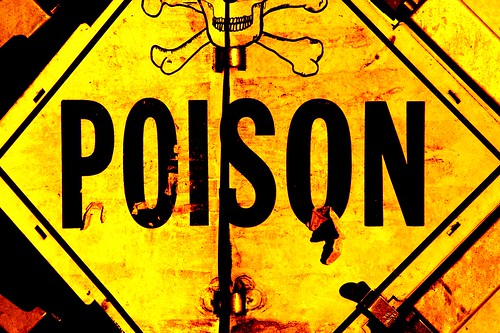I had a conversation with an Oklahoma educator today who confirmed something I’d suspected and guessed for quite awhile: In one of our large metro-area school districts, ANY website which has ANY interactivity of ANY kind (blog, wiki, social networking site, etc) is blocked because that type of interactivity is viewed by district leaders as dangerous and inappropriate.
Web 2.0 is poisonous, don’t ya know?!
I’m so glad our children are being protected from the digital communications landscape. After all, none of them will be expected to make independent, ethical choices when they set foot outside a school building or their homes. Recent studies indicate all digital technologies will self-destruct soon, and we’ll happily go back to the stone age. It’s wonderful to live in an environment where our learning needs are so well tended.
I’d suggest someone around here start unmasking the digital truth, but it turns out no one really cares about the truth or the real world.
Is my attitude OK here? Probably not. Situations like this really upset me.
Technorati Tags:
block, blog, censor, network, oklahoma, podcast, social, website, wiki



Comments
15 responses to “Any interactive website is poison”
Not surprised by this. I know many administrators who feel the same way about interactive sites. It is something outside of their control. To them that lack of control is bad and most of it seems to come down to public relation concerns…
Instead of a proactive stance many choose to have no stance at all.
Not only is your attitude not “OK,” I can’t help but thinking your conclusion might be dishonest.
“is blocked because that type of interactivity is viewed by district leaders as dangerous and inappropriate.”
I’m guessing – and you’re familiar with the situation, I’m not – that these sites are blocked because the interactive elements can’t be monitored or ensured to be safe. In my opinion, that’s not the right approach for a Board/administration to take, but the point is that being overly-concerned with safety is a very different situation than all interactivity being “dangerous and inappropriate.”
If I’m wrong – and I fully admit that I might be – prove it. Whether it’s Board meeting minutes or a copy of an overreaching internet regulation policy that shows your summary of their justification, let’s see it. And if I am, I’ll be happy to help the wayward administration better understand the value of interactivity in media, scholarship and learning.
Good challenge, Matthew, I’ll look for the board minutes and see if I can find this in writing. I’ll also see if I can interview the supt and board members to get to the root of this perception and understood policy.
Does that mean all the news sites that offer comments are blocked? I find it humorous that many school districts are looking at blocking any social networking, which would also mean that Google would need to be blocked.
As a parent with a child in one of these metro schools, I have also heard similar sentiments about interactive web content. I think that school officials truly do see all interactivity as dangerous and inappropriate because they can not control it. It isn’t so much an either/or situation like Matthew is suggesting. It is more that the root cause of the blocking is the fear of inappropriate content being shared with our innocent students. I understand where you are coming from Matthew because it seems crazy that educators would feel that way. Based on conversations I have had with more progressive teachers in my district, this is absolutely true. Never mind the fact that kids are on YouTube, facebook, and all sorts of other sites at home. I feel like schools are failing to educate kids to have judgement about interactive sites in their attempts to shield them from all “bad” content.
Keep the faith Wes. Eventually the hold outs will retire and a new generation of educators will take their places. Every time you make a connection in your Tech for Teachers class, you are making a long term difference in open digital doors for our kids.
Well, sadly I’ve been in some districts here in the MidWest which DO block Google. Talk about heads in the sand.
I think we need web-based scripts which can be run and report (sort of like submitting a Google Form) what websites are blocked where. When I finish my dissertation and get those initials I think this might be a worthwhile research angle to tackle. I’d like to base my perceptions of Internet blocking in schools off more than my own limited experiences. But to answer your question, YES, some schools ARE choosing to block all news sites which permit/allow commenting.
When Google is blocked entirely in an Oklahoma school, you can be sure the administration is either not aware of the state mandate for teachers as well as students to meet NETS, or doesn’t care.
Thanks for your words of encouragement, Andrea. 🙂
Again – are they against interactivity as an action [I doubt it] or paranoid about filtering content? There’s a major distinction here, and that diagnosis determines how to deal with the issue most effectively.
Of course they’re blocked.
My own class uses a wiki which is either a walled garden or a spooky tree house, depending on how you look at it. On the student side, it’s only open to the seventeen kids in my two classes (not my usual load by any means — I’m involved in accreditation efforts this year pretty heavily), and as far as I know, no adult other than me ever checks the content.
It’s pretty clear that the kids would rather be playing digital online games, surfing their own chosen sites, or participating in a larger culture. The school views all these things as dangerous distractions; I’m caught in the middle, most days. I’m tell students to go to our school wiki, and practice writing and editing there. Their response is to copy-past sentences from Wikipedia, and demonstrate that someone else has already created the content I’m asking for — so why is it their business to recreate it? And the evidence from the ‘net is that everyone else is doing the same thing… I copy-paste their sentences into Google, and find DOZENS of sites that have plagiarized Wikipedia for their text content on Alexander the Great.
Hmm.
It appears we have a catch-27 or so. Schools continue to cling to an existing model of creativity and skills practice — “within a limited range of chosen vocabulary and writing abilities, invent some new summary or analysis of this information” — and the students demonstrate, with Internet access, that “someone has already done that, so why do I have to?”
I confess, I no longer know how to change either my colleagues to be more internet-savvy and tech-integrated in the classroom; or to help students understand their old-school teachers any better; or to guide my students to understand that writing practice in a walled garden is at least better than the old single-page model.
I’m saddened at how much of this occurs, throughout the United States. I am reminded of your Censored for Relevance post (http://www.speedofcreativity.org/2006/04/11/censored-for-relevance/) almost four years ago. We do not seem to be getting closer to free speech, but further away. As far back as August of 2007 the NSBA urged us to teach Social Networking skills, not ban (http://www.nsba.org/SecondaryMenu/TLN/CreatingandConnecting.aspx) – somehow education continues to take a back seat to learning, and the only way to learn is to leave the school.
I am a teacher in a large metro area school district in Oklahoma who found her Wikispaces pages suddenly blocked right before Winter break. My students were trying to finish their music technology projects in which they were required to post their work to our class wiki. When I called the IT dept., I was informed that Wikispaces was considered a social network by the update to the web filtering software.
I was then told that the district’s biggest concern (at least according to this person) was that students could upload porn from home and then download it at school through these sites and then the district would lose its federal money! What a sad misunderstanding/misinterpretation of the law. My first unspoken reaction was “Have you ever heard of a flash drive?”
Wikispaces was unblocked the next day after I assured him that no one could comment unless they requested membership from me and I monitored the site daily.
Sadly, even more of the free resources that I used are now unavailable for my 2nd semester classes because of the filtering rules that are now in place. Also, the district has now blocked usage of the internet from any computer that doesn’t login through Active Directory. This effectively knocks out half of my available computers. My lab computers were donated to me and refurbished by me (because why would a music teacher need computers?). Previously with my donated lab and a district laptop cart, we were nearly 1 to 1, but now we are reduced to 24 balky district laptops for 30 students and we have to give those up for testing dates soon.
How sad for our students in a district where school is the only place that many can use a computer or the internet. How sad in these times of financial crisis that these free resources are blocked, squandered, and even feared because of misinformation and a desire to control/”protect”.
Our students need to learn to use the internet responsibly. What better place to teach them than school?
I agree with the comments posted here and just want to add one more perspective to this unfortunate reality that you have pointed to: At the end of the day, school administrators are far more concerned about controlling law suits, and controlling the media in reporting on the schools. Schools will be more open to free access to the internet when parents become more understanding of isolated instances where something inappropriate might drift in from the web. I can just see the self-absorbed mom crying into the camera now about how her child was scarred for life by viewing something she thinks is inappropriate at school.
Wes, you say: I think we need web-based scripts which can be run and report (sort of like submitting a Google Form) what websites are blocked where. When I finish my dissertation and get those initials I think this might be a worthwhile research angle to tackle. I’d like to base my perceptions of Internet blocking in schools off more than my own limited experiences.”
How right you are about the fact that the topic needs research, and that we need more than teacher perceptions to fight our case. Part of the problem in my former district (I’m a recently retired teacher librarian) is that the filtering issues seem to vary dramatically from school to school in the same district.
As principals determine the policy for each school, some principals allow all their teachers to over-ride blocks; others don’t. However, even those who can get past the blocks find many inconsistencies — one teacher can access his class blogs but the RSS feeds are blocked. Utter nonsense!
Thanks for your continued efforts to fight this attack on 21st century teaching and learning, and also thanks for your link to my blog entry. I lookf orward to your research 🙂